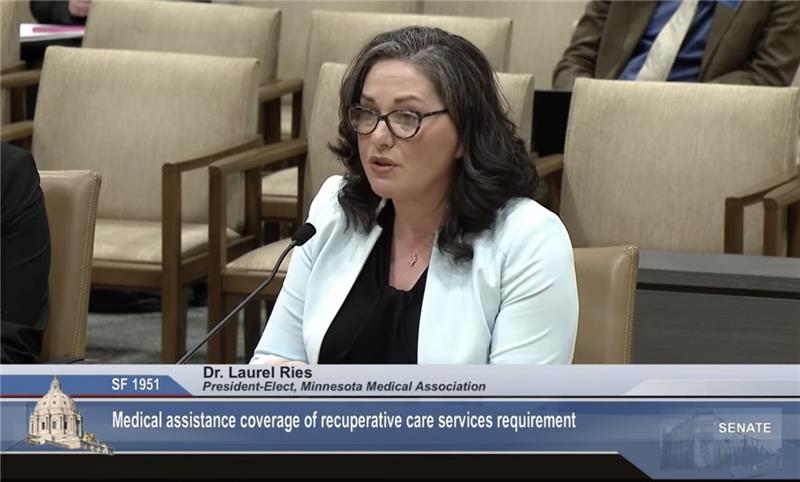Legislative Session Starts; MMA to Focus on 5 Major Issues
February 19, 2026
State lawmakers returned to St. Paul on February 17 for the second half of the 2025-2026 biennium.
March 23, 2023
An MMA priority bill to offer Medical Assistance (MA) coverage for recuperative care services for Minnesotans experiencing homelessness who need a place to recover following a hospitalization, was heard this week by the Senate Health and Human Services Committee.
After a favorable reception from the committee, it was laid over for possible inclusion in an omnibus bill. Both the House and Senate versions have now been laid over for possible inclusion in a later omnibus bill, which should be finalized in the coming weeks.
 |
| President-elect Laurel Ries, MD, testifies before the Senate Health and Human Services Committee on March 22. |
“Patients experiencing homelessness are twice as likely to be readmitted within a week of discharge from the hospital and are more likely to be admitted to the hospital to care for high risk, costly conditions,” said MMA President-elect Laurel Ries, MD, in support of SF1951 (Morrison, DFL – Deephaven). “To ensure that Minnesotans experiencing homelessness can receive needed care in their recovery following hospitalization, the MMA is in strong support of expanding Medical Assistance coverage to include recuperative care.”
The MMA has included SF1951 as one of its 2023 legislative priorities this session, as a way to address the adverse health impact of homelessness. This is a major social driver of health.
The MA coverage would pay for needed services like care coordination, social services, and other services needed for recovery. It would not cover the cost of short-term housing because federal law prohibits Medicaid funds to pay for shelter.
Ries also weighed in on SF1465 (Morrison, DFL – Deephaven), a bill to require MA and MinnesotaCare to provide coverage for advance care planning services.
“During an emergency or at the end of life, patients will face questions about their medical treatment and not be able answer them. That is not the time to begin discussions about what care the patient does or does not want at the end of life,” Ries said. “Research shows that patients are more likely to get the care they want if the conversations about their future medical treatment are had before that care is needed, and they can put a plan in place.”
The bill was laid over for inclusion in the omnibus budget bill.
February 19, 2026
State lawmakers returned to St. Paul on February 17 for the second half of the 2025-2026 biennium.
February 19, 2026
On the second day of the legislative session, MMA leadership was already advocating for one of its top priorities - minimizing the harm of federal changes to Medical Assistance (MA).
February 19, 2026
Legislation to prohibit the use of artificial intelligence (AI) in prior authorization requirements was heard in the House Commerce Finance and Policy Committee on February 19.